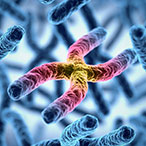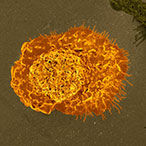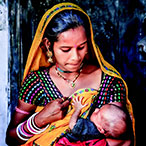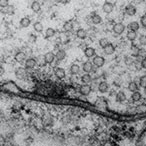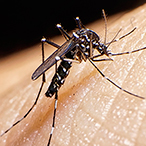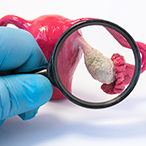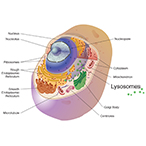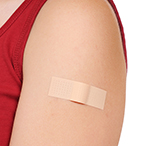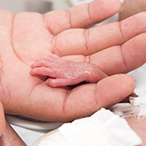Study finds that a second operation benefits the small subset of women who choose reoperation for recurring symptoms.
News
NICHD issues News Releases and Media Advisories to the news media. Spotlight and Research Feature articles explain NICHD research findings and public health issues to the general public. An Item of Interest is a short announcement of relevant information, such as a notable staff change.
Release: Simulated driving program reduces crash risk for teens with ADHD in small study
A program that combines computer-based and driving simulator training may reduce the proportion of crashes and near crashes among teens with attention-deficit/hyperactivity disorder (ADHD), according to a small study funded by the National Institutes of Health. Teens who took the training, which aims to reduce the number of long glances away from the roadway, had a nearly 40% lower risk for crash or near crash, compared to a similar group who did not undergo the training.
Science Update: Mouse model of rare disease highlights importance of balance between two opposing proteins
Reducing levels of the protein WAPL may partially correct disease traits caused by a deficiency of NIPBL, a protein with the opposite function, suggests a mouse study by NICHD scientists. The findings suggest the importance of striking a proper balance between NIPBL and WAPL activities and improve understanding of the mechanisms underlying the rare developmental disorder Cornelia de Lange syndrome.
Science Update: Common chemical may promote fibroid growth, small NIH-funded study suggests
Exposure to a chemical found in a wide variety of consumer products may trigger the growth of uterine fibroid cells and delay the rate at which they die, suggests a study
funded by the National Institutes of Health. The study provides a potential explanation for why women exposed to industrial chemicals known as phthalates—found in personal care products, food packaging, and medical products—have higher rates of fibroid tumors than other women. The findings may also inform future strategies to prevent or treat fibroids.
Science Update: NIH-funded study in mice suggests bacteria rely on metal tolerance to cause pregnancy-related infection
A bacterial species that causes chorioamnionitis—an infection of the placenta and fetal membranes that often leads to preterm birth—relies on a gene for metal tolerance to hijack immune cells, suggests a study in mice funded by the National Institutes of Health. The findings indicate that strategies to target the gene and its products could eliminate one of the most common causes of preterm birth.
Media Advisory: NIH-funded researchers to begin study of intravenous iron treatment for post-pregnancy anemia
Researchers supported by the National Institutes of Health are launching a large study to evaluate a single dose of intravenous iron to treat women experiencing anemia
after giving birth. The study will enroll nearly 5,000 women in Bangladesh, India, Pakistan, the Democratic Republic of Congo, Kenya, Zambia and Guatemala.
Director's Corner: Expanding Contraceptive Choices
A safe, highly effective, reversible method of male contraception would fill an important public health need. Additionally, multipurpose prevention technologies (MPTs)—products that prevent both pregnancy and sexually transmitted infections—would increase sexual and reproductive health options for both women and men. NICHD supports a broad range of contraceptive research, including efforts to develop male contraceptives and MPTs.
Science Update: Caffeine consumption during pregnancy may lead to slightly shorter child height
Exposure to caffeine in the womb, even in small amounts, may lead to shorter height in childhood, suggests an analysis by NICHD researchers. Children of women with low caffeine intake during pregnancy were slightly shorter than their peers born to women who consumed no caffeine while pregnant. The gaps in height widened between ages 4 and 8 years.
Spotlight: Scientific Advances from the Division of Intramural Research
The Division of Intramural Research provides fundamental knowledge about the nature and behavior of living systems through basic, clinical, and population-based research.
Media Advisory: No increase in risk of serious pregnancy complications during early pandemic, NIH-funded study suggests
Compared to giving birth in 2019, giving birth in 2020 during the early stages of the pandemic was not associated with a higher risk of maternal death or a serious complication of pregnancy, suggests a study funded by the National Institutes of Health.
Science Update: Placental malaria may slow glucose flow to the fetus, NIH-funded study suggests
Malaria infection of the placenta may reduce the amount of glucose that passes to the fetus, according to an NIH-funded study. The research involves a placenta on a chip model—a laboratory device incorporating placental tissue to simulate the interface between maternal blood and the outermost part of the placenta. The findings offer insight into how placental malaria may deprive the fetus of an essential nutrient and may inform the development of strategies to prevent or treat the condition.
Science Update: Physicians may need more training to improve care for people with disabilities, NIH-funded study suggests
Some physicians are declining to care for patients with disabilities, saying they lack the knowledge required to care for them, suggests a focus group study of American physicians funded by the National Institutes of Health. Moreover, many physicians in the study said they had limited training on the Americans with Disabilities Act (ADA), the federal civil rights law that prohibits discrimination against people with disabilities, and some said they felt overwhelmed by the ADA requirements.
Director's Corner: Reflecting on the Past and Looking to the Future
This October, NICHD celebrates its 60th anniversary and holds the first meeting of a new task force examining stillbirth in the United States. NICHD Director Dr. Diana W. Bianchi looks forward to future progress toward the institute’s goals of promoting healthy pregnancies, raising healthy children, and ensuring healthy and
optimal lives.
Science Update: NIH-led working group proposes new paradigm of ovarian anatomy
A group of experts led by NICHD has proposed a new anatomic model of the ovary and recommended standardized nomenclature to describe its major features.
Spotlight: Expanding Research Opportunities at NIH for Howard University Students
Learn about a collaboration between NICHD and Howard University.
Item of Interest: NICHD researchers collaborate with basic scientists to understand rare, fatal childhood neurological disorder
NICHD researchers conducting a clinical study of patients with a rare, fatal neurological disorder have partnered with basic scientists to find better ways to understand the disease, monitor its progression, and ultimately find treatments.
Release: Study confirms link between COVID-19 vaccination and temporary increase in menstrual cycle length
A large international study has confirmed the findings of a previous U.S. study that linked COVID-19 vaccination with an average increase in menstrual cycle length of less than one day. The increase was not associated with any change in the number of days of menses (days of bleeding). Funded by the National Institutes of Health, the new study included data from nearly 20,000 people from Canada, the United Kingdom, the United States, Europe and other parts of the world who received any of nine different vaccines. For most study participants, the increase resolved in the cycle following vaccination.
Release: Prenatal steroid treatment may improve survival, reduce complications for extremely preterm infants
Steroid treatment before birth appears to improve survival and reduce complications among extremely preterm infants, according to a study funded by the National Institutes of Health. Antenatal steroid therapy, given to women at risk of preterm delivery, causes the fetal lungs to mature and has been shown to improve survival and reduce complications among infants born from 24 to 34 weeks of pregnancy. However, previous studies of the treatment for infants born between the 22nd and 23rd week—those at greatest risk for death and disability—were inconclusive.
Science Update: Pre-existing distress may increase risk for long COVID, NIH-funded study suggests
Psychological distress before COVID-19 infection—feeling stressed, depressed, anxious, worried, or lonely—may raise the risk for long COVID, suggests a study funded by the National Institutes of Health.
Spotlight: Advancing neuroscience research for children around the world
Eight years ago, NIH announced a collaboration with the Bill & Melinda Gates Foundation to develop solutions for a variety of global health challenges. Learn how NICHD research is supporting this goal.
 BACK TO TOP
BACK TO TOP


